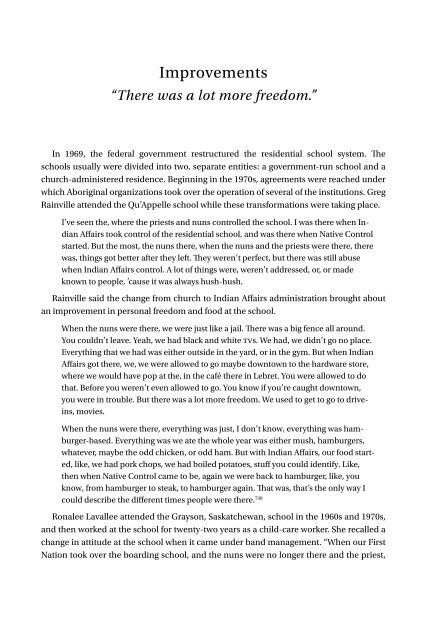The Survivors Speak
1MB8J05
1MB8J05
You also want an ePaper? Increase the reach of your titles
YUMPU automatically turns print PDFs into web optimized ePapers that Google loves.
Improvements<br />
“<strong>The</strong>re was a lot more freedom.”<br />
In 1969, the federal government restructured the residential school system. <strong>The</strong><br />
schools usually were divided into two, separate entities: a government-run school and a<br />
church-administered residence. Beginning in the 1970s, agreements were reached under<br />
which Aboriginal organizations took over the operation of several of the institutions. Greg<br />
Rainville attended the Qu’Appelle school while these transformations were taking place.<br />
I’ve seen the, where the priests and nuns controlled the school. I was there when Indian<br />
Affairs took control of the residential school, and was there when Native Control<br />
started. But the most, the nuns there, when the nuns and the priests were there, there<br />
was, things got better after they left. <strong>The</strong>y weren’t perfect, but there was still abuse<br />
when Indian Affairs control. A lot of things were, weren’t addressed, or, or made<br />
known to people, ’cause it was always hush-hush.<br />
Rainville said the change from church to Indian Affairs administration brought about<br />
an improvement in personal freedom and food at the school.<br />
When the nuns were there, we were just like a jail. <strong>The</strong>re was a big fence all around.<br />
You couldn’t leave. Yeah, we had black and white tvs. We had, we didn’t go no place.<br />
Everything that we had was either outside in the yard, or in the gym. But when Indian<br />
Affairs got there, we, we were allowed to go maybe downtown to the hardware store,<br />
where we would have pop at the, in the café there in Lebret. You were allowed to do<br />
that. Before you weren’t even allowed to go. You know if you’re caught downtown,<br />
you were in trouble. But there was a lot more freedom. We used to get to go to driveins,<br />
movies.<br />
When the nuns were there, everything was just, I don’t know, everything was hamburger-based.<br />
Everything was we ate the whole year was either mush, hamburgers,<br />
whatever, maybe the odd chicken, or odd ham. But with Indian Affairs, our food started,<br />
like, we had pork chops, we had boiled potatoes, stuff you could identify. Like,<br />
then when Native Control came to be, again we were back to hamburger, like, you<br />
know, from hamburger to steak, to hamburger again. That was, that’s the only way I<br />
could describe the different times people were there. 730<br />
Ronalee Lavallee attended the Grayson, Saskatchewan, school in the 1960s and 1970s,<br />
and then worked at the school for twenty-two years as a child-care worker. She recalled a<br />
change in attitude at the school when it came under band management. “When our First<br />
Nation took over the boarding school, and the nuns were no longer there and the priest,


